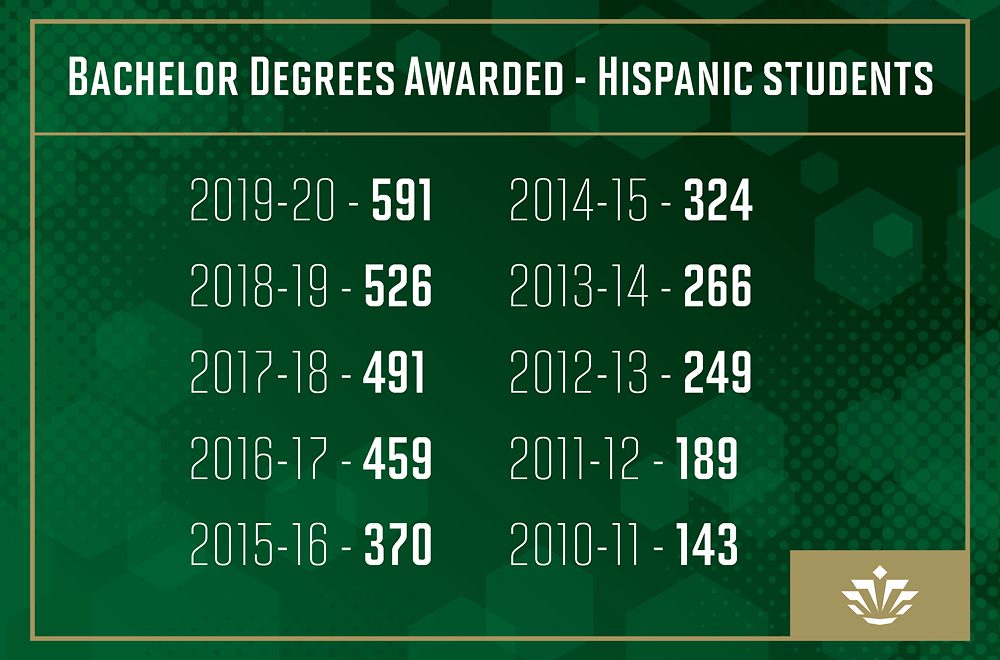BONNER LEADER SPOTLIGHTED IN ARTICLE ON LATINX STUDENT SUCCESS
When Claudia Martinez, the daughter of Mexican immigrants, began her first day of classes at UNC Charlotte four years ago, she already had a support network in place thanks to the University’s commitment to access, inclusion and equitable academic experiences.
Because of this commitment, UNC Charlotte is the No. 1 institution in North Carolina in awarding bachelor’s degrees to Latinx students, according to a recent analysis by Excelencia in Education. Not only does UNC Charlotte enroll more Latinx students than any other four-year college or university in North Carolina, but it also graduates Latinos at a higher rate.

Over the past decade, the number of Latinx undergraduates has risen annually, from 143 in 2010-11 to 591 last year. Furthermore, Latino freshman enrollment is up 43 percent since last academic year, and like Martinez, nearly 33 percent (approximately 2,100) of the incoming class are first-generation college students.
“It is so important to see other students like me on campus,” said Martinez, who chose UNC Charlotte because she wanted to be close to home to help her family and younger siblings, while still living on campus and enjoying the full college experience.
She considers the University Transition Opportunities Program (UTOP), which helps facilitate the underrepresented student’s transition from high school to college, to be a key to her success in college.
“UTOP is the most amazing program. It helped me get engaged right away and showed me the kind of student I want to be. It’s where I met my first friends and learned about all the helpful resources on campus,” Martinez said.
Now a senior double-majoring in International Business and Spanish, Martinez helped establish and is the vice president of the Latinx Student Union, which is designed as a safe space for all Latinx students to come together and find ways to connect with the larger Charlotte community.
“This was important to me to get started before I graduated because I want to leave a mark. I want to see the Latinx community have a greater voice at UNC Charlotte.”
She also is involved in the Bonner Leaders program and interned at the Camino Community Center where she oversaw referrals and provided translation services through her role as a food pantry coordinator.
DIVERSE CAMPUS
Alumnus Lennin Caro ’14, ’17, the son of Columbian immigrants, also chose UNC Charlotte over other selective universities so he could remain close to his family. While in college, he commuted to his family home in Huntersville each evening.
Caro, who now is an anthropology instructor at UNC Charlotte, was introduced to UNC Charlotte through the Latin Americans Working for Achievement (LAWA) organization, where he was awarded a college scholarship. LAWA is a community organization that provides guidance and resources to Latinx high school students and their families on planning and preparing for college. The majority of LAWA participants are first- or second-generation U.S. citizens.
“UNC Charlotte has an appeal to Latinx students because it has a very diverse campus that is welcoming to minority students — and there are many degree programs and options for career paths,” said Ana Silva Rey ’98, LAWA executive director. “Latinx students are drawn to the University’s location in a large metropolitan area and its connections to local companies for job opportunities after college.”
North Carolina has the 11th largest Latinx population in the U.S. Of that, 10 percent is Latino. With a mission of access, UNC Charlotte seeks to reach these potential students.

LATINX RECRUITMENT
UNC Charlotte’s new assistant director for Hispanic and Latinx recruitment, Jennifer Hamilton, partners with the University’s Latino/Hispanic Faculty Staff Caucus to provide special programming. In addition, the University provides Spanish-speaking student tours and students panels, as well as recruitment and admissions materials in Spanish.
“From our Latino Caucus, multicultural student clubs and organizations, to our support positions in the admissions process, our goal is to ensure we welcome not just the student, but also the family, in the higher education search,” Hamilton said. “When prospective families engage with our admissions process, they find that we have staff and faculty across our university who share in their culture, speak native Spanish, and celebrate their journey to higher education. This representation is important and vital to helping students and their families see themselves in our learning community.”
The University’s student success programs naturally benefit Latino and Hispanic students. UNC Charlotte has a three-pronged approach to improve student success rates, especially among underrepresented and first-generation students. The 49er Graduation Initiative helps students select the right major and supports them as they progress through their course of study. Through the University’s Prospect for Success curriculum, more than 90 percent of incoming first-time college students take a semester-long academic engagement class that strengthens their commitment and ability to succeed as a college student. The University also redesigned its advising system to be more proactive. Finally, the University called on all academic departments to examine their majors to reduce barriers to degree progression and graduation.
“It has been gratifying to see that as the population of Latinx students has grown in Charlotte, many of those students have chosen UNC Charlotte. We are committed to fostering an environment that promotes their academic success and prepares them for productive careers,” said Joan Lorden, provost and vice chancellor for Academic Affairs at UNC Charlotte.
PATH TO SUCCESS
UNC Charlotte also is focusing its efforts on transfer student success. For example, 49erNext is extending UNC Charlotte’s partnership to more North Carolina community colleges to benefit students who plan to transfer to UNC Charlotte to pursue a bachelor’s degree. This unique program allows community college students to seamlessly transfer to UNC Charlotte as a junior. Hispanic students comprise 33% of the first cohort of 49er Next students from Central Piedmont Community College.
“Our partnerships with regional community colleges work to ensure that transfer students have clear pathways and tailored advising from the beginning of their college journey, and our transfer credit policies and practices are designed to give students every advantage possible regardless of where they started,” said Claire Kirby, associate provost for Enrollment Management. “The University remains a destination for students who, for a variety of reasons, started their college career elsewhere. Their varied educational backgrounds and experiences contribute to our diverse campus community, and we are committed to their success.”
UNIVERSITY LEADS THE STATE IN AWARDING DEGREES TO LATINX STUDENTS